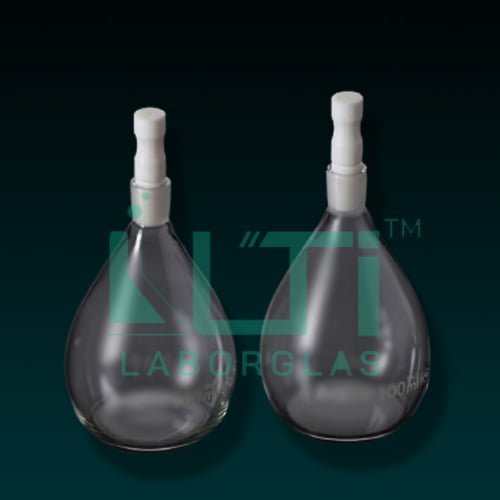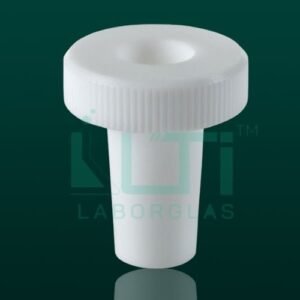- Manufactured from ASTM 438 TYPE 1 BORO
- Boro 3.3 GLASS, DIN ISO 3507, without certificate
| PART No. | Capacity (ml) | Tolerance (±ml) | PACK Qty. |
| 5160-10 | 10 | 1.0 | 2 |
| 5160-25 | 25 | 2.0 | 2 |
| 5160-50 | 50 | 3.0 | 2 |
| 5160-100 | 100 | 3.0 | 2 |
Here are some common uses of Pycnometers calibrated to Gay-Lussac, with a Teflon stopper, and conforming to ISO standards:
- Density Determination:
- Pycnometers are primarily used for measuring the density of liquids accurately. The Gay-Lussac method involves filling the pycnometer with a known volume of liquid at a known temperature, and the Teflon stopper ensures a secure and inert seal.
- Quality Control in Industries:
- These pycnometers are often employed in quality control laboratories, particularly in industries such as pharmaceuticals, chemicals, and beverages, where precise measurement of liquid density is crucial for ensuring product quality and compliance with ISO standards.
- ISO Compliance:
- Pycnometers adhering to ISO standards are used to meet international requirements for accurate density measurement. Compliance with ISO standards ensures consistency and comparability of measurements across different laboratories.
- Material Characterization:
- Pycnometry is a valuable technique for characterizing materials, and pycnometers with Teflon stoppers may be used when working with corrosive or reactive liquids.
- Experimental Research:
- In scientific research, these pycnometers are used to determine the density of liquids as part of various experiments and investigations, providing reliable and precise data.
- Calibration of Instruments:
- Pycnometers themselves can be used for the calibration of volumetric glassware, helping ensure the accuracy of other laboratory equipment used for liquid measurement.
- Volume Calibration:
- Pycnometers are used for calibrating and verifying the accuracy of other volumetric instruments in the laboratory.
- Chemical Compatibility:
- The Teflon stopper provides chemical resistance, making these pycnometers suitable for use with a wide range of liquids, including those that may react with other materials.
- Standard Reference in Laboratories:
- Pycnometers with Teflon stoppers, calibrated to ISO standards, may be used as standard reference equipment in laboratories, contributing to the traceability and reliability of density measurements.
- Educational Purposes:
- These pycnometers can be used in educational laboratories to teach students about the principles of density measurement, the calibration of laboratory equipment, and the importance of using inert materials in certain applications.







